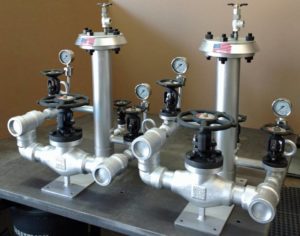 An industrial oil filter plays a crucial role in maintaining the quality of thermal fluid and oil in lubricated systems. It prevents dirt and other carbon solid particles from contaminating systems and causing damage to the components of industrial equipment. Oil production and recycling facilities use filters as critical components in their manufacturing process. It’s important to decide how clean the lubricating or heat transferring oil needs to be in a thermal oil boiler and similar types of applications because the cost of oil products increases rapidly with their level of cleanliness. Determining optimum target cleanliness for a system’s contamination control program is also crucial in order to optimize the location of an industrial oil filter. This way, effective filtration and solid particle ingression control and balance can be maintained while ensuring easy access for filter element replacement and overall system maintenance. Below are some crucial guidelines for using industrial oil filters:
An industrial oil filter plays a crucial role in maintaining the quality of thermal fluid and oil in lubricated systems. It prevents dirt and other carbon solid particles from contaminating systems and causing damage to the components of industrial equipment. Oil production and recycling facilities use filters as critical components in their manufacturing process. It’s important to decide how clean the lubricating or heat transferring oil needs to be in a thermal oil boiler and similar types of applications because the cost of oil products increases rapidly with their level of cleanliness. Determining optimum target cleanliness for a system’s contamination control program is also crucial in order to optimize the location of an industrial oil filter. This way, effective filtration and solid particle ingression control and balance can be maintained while ensuring easy access for filter element replacement and overall system maintenance. Below are some crucial guidelines for using industrial oil filters:
- Determine original equipment manufacturer (OEM) specifications for flow rates, pressure drop, nominal or absolute micron rating and only choose or use filter media that meet these specifications and requirements. Replace oil filter elements at the recommended interval or before the filter’s life cycle is up to maintain efficiency, especially when working under contaminated conditions.
- Monitor soot and hydraulic fluid contamination levels periodically using oil analysis in order to properly monitor and address contamination. Consider the use of depth-type filters on your hydraulic and engine systems, particularly on parallel or side stream circuits in order to control hydraulic system silt, combustion soot, and water contamination. Depth-type filters are ultra absorbent and are especially effective in eliminating water contamination.
- Coarse filters are never the best choice when you want to obtain much longer filter life. If you notice high contamination levels, opt to change filters often and obtain and use larger filters to increase their dirt holding capacity and prolong their use cycle. Expect much shorter filter life when first installing depth-type filters—this is a common yet temporary situation because the finer filter must first get rid of the contamination that the previous, full-flow filter may not have been able to remove.
- Do not drain oil without first replacing your oil filter element. Avoid adsorbent filters that contain chemically active elements like fuller’s earth or charcoal, which could end up removing oil additives as a result of chemical reaction.
- Finally, always use breather filters with the same gauge as your full flow filter for your hydraulic reservoir and make sure to maintain correct viscosity of hydraulic and lubricating oils to maintain system efficiency and avoid problems along the way.
Liquid Process Systems Inc. offers their expertise when it comes to heat transfer fluid filtration, thermal fluid filtration, and hot oil filtration as they are used and applied in continuous filtration and process heating and cooling applications. The company offers hot oil filtration and industrial filtration products ranging from oil boiler and thermal oil boiler products to heat transfer fluids, coolant filters, industrial oil filter elements and custom filtration systems. Additionally, they offer custom equipment fabrication to meet the unique needs of your plant processes.
